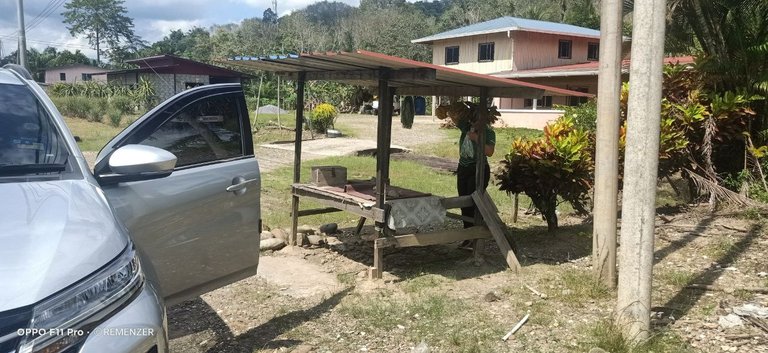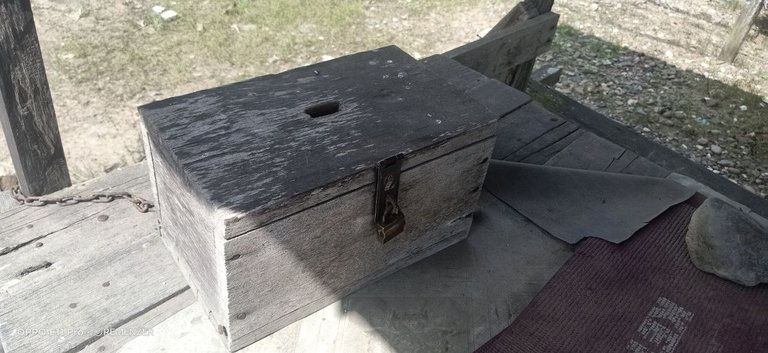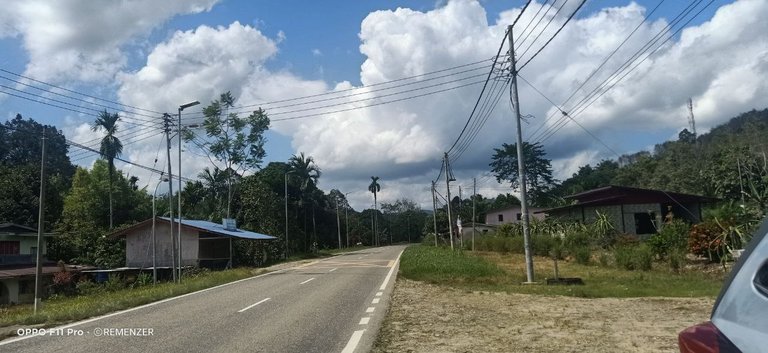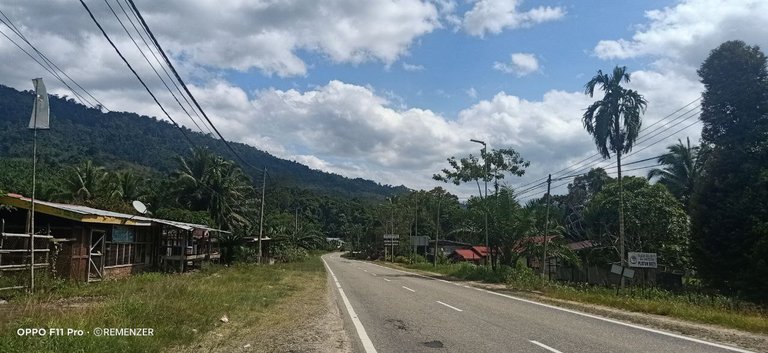🫡The Roadside Stall of Trust: 📝A Lesson in Community Integrity
Hello Hive Asean Community! How are you all doing today? I'm hoping everyone is in great health and spirits.
I'm excited to share with you a remarkable experience that's part of my daily routine. There's this small stall I pass by every day while driving to work or heading back home. It's about 20 kilometers from my house, and it's not your ordinary roadside vendor.

This stall is special for a reason that might seem unusual at first glance: there's no one manning it. You read that right – no vendor, no salesperson, just the stall itself, adorned with fresh fruits and vegetables, and a wooden locked box with a small hole on top, just big enough to slip in money. Each item has its price tag, and customers are expected to put the exact amount for what they take. It operates purely on trust – no surveillance, no oversight.

The fact that it has been functioning like this for years is a testament to the trust the owner places in locals and passersby. Every time I drive past this stall, I can't help but feel amazed. It's a small window into the power of trust and honesty in our community.

Imagine this: every morning, the owner of the stall sets up his array of fresh fruits and vegetables, carefully pricing each item, and then leaves, entrusting the entire operation to the hands of his unseen customers. This isn’t just a business transaction; it's a profound statement of trust. The owner is silently saying, “I believe in you, the people of my community, to do the right thing.” This simple act creates a powerful bond between him and his customers. They're not just anonymous buyers anymore; they're trusted partners in this unique exchange. This kind of trust fosters a strong sense of community and shared responsibility. People don't just see a fruit stall; they see a symbol of mutual respect and reliance.
Now, let's broaden our lens and think about the bigger picture. When you're trusted, it feels good, right? It's like a pat on the back, a nod that says, “I believe in your goodness.” This feeling is incredibly motivating. In a community where trust is given freely, people are more inclined to live up to that trust. They act more responsibly and considerately because they don't want to betray the faith someone has in them. It's like a positive cycle – trust breeds more trust.
Think about it this way: when you see others respecting this system, leaving the right amount of money at the stall, it reinforces your belief in the goodness of people. It's contagious in the best way possible. You start believing that if so many can be trusted, why can't this be the norm everywhere? This belief slowly seeps into other parts of life. It's not just about a fruit stall anymore; it's about how we view and treat each other in our community. People start to trust more in other aspects of their lives, and this trust makes the community more cohesive, more resilient.
This trust isn't blind; it's built on the understanding that most people are inherently good and that given the chance, they'll often choose to do the right thing. And when people occasionally don't live up to this trust, it's seen as an exception, not the rule. The community doesn't crumble because of a few setbacks; instead, it often becomes stronger, rallying around its shared values.
So, this unassuming stall by the roadside isn't just a place for transactions. It's a testament to the power of trust in building stronger, more connected communities. It shows us that when trust is the foundation, communities not only thrive economically but also become more harmonious places to live in, where people feel valued, respected, and part of something bigger than themselves.

Let's delve deeper into the concept of the honesty box, a cornerstone of our charming roadside stall story. This small, unassuming box is more than just a receptacle for money; it's a profound symbol of trust and faith in human integrity. Picture this: a wooden box, slightly weathered by time, standing silently at the stall, its small slit a gateway to a world of trust. The owner, by choosing not to oversee transactions, sends a powerful message: "I trust you." This isn't just about fruits and vegetables; it's about believing in the goodness and honesty of people. It's a bold statement, especially in today's world, where skepticism often reigns.
Now, think about what happens each time a customer stops by, picks up an apple or a bunch of carrots, and then pauses to drop the exact amount of money into the box. That moment is more significant than a simple purchase. It's a personal testament to integrity. In a world where we're constantly watched—be it by cameras, supervisors, or societal norms—the honesty box offers a unique space where your actions are unmonitored. Here, you're not being honest because you're being watched or because you fear consequences. You're honest because you choose to be, because it aligns with your personal values.
Each coin slipped through that slot is a whisper saying, "I choose to do the right thing." It's a quiet yet powerful victory for personal integrity. This repeated action, this choice of honesty even in the absence of surveillance, reinforces a crucial life lesson: the most rewarding kind of integrity is the one practiced in private, without the lure of recognition or reward. It's about being true to oneself.
The honesty box at our little stall becomes a daily reminder of this. It stands there, not just collecting money, but collecting stories of countless individuals who, day after day, choose to do the right thing. It's a reminder that despite the complexities of human nature, there is a simple, unwavering line of integrity that many choose to walk along. This ongoing practice of honesty nurtures a deeper sense of self-respect and fulfillment. It's about knowing that even in the smallest of actions, like paying for a bunch of bananas at a roadside stall, lies the opportunity to affirm one's values and beliefs.
So, in its simplicity and quiet presence, the honesty box teaches us something profound about human nature and the choices we make. It's a celebration of the fact that when given the opportunity, many of us will choose integrity, not because we have to, but because we want to, because it resonates with who we are and who we aspire to be.

Alright, let's unpack the idea of sustainability in trust-based transactions, taking our unique roadside stall as a real-life example. This stall isn't just a quaint outlier; it's a shining beacon of how trust can form a sustainable foundation for economic dealings. When we talk about sustainability here, we're not just referring to environmental aspects, but to the endurance and viability of a business model based on trust.
In the case of our stall, sustainability is evident in its continued existence and success. It's been there for years, thriving without the traditional business safeguards like surveillance or enforcement. This setup hinges on a simple yet powerful belief: people, when trusted, will mostly act honorably. This trust isn't naive; it's calculated and based on a deep understanding of community dynamics. The stall's enduring presence proves that such a model isn't just a whimsical idea, but a viable way of conducting business.
Now, let's scale up this concept. Sure, not every business can run solely on an honor system. A big-box retailer or an online shop can't just leave their goods out with an honesty box. However, the underlying principle—integrating trust into business practices—has broader implications. Imagine larger businesses adopting elements of this trust. It could manifest in more flexible return policies, honor-based pricing for certain services, or community-supported agriculture where customers pay upfront for seasonal produce. These practices signal to customers that they are trusted, valued, and seen as partners rather than just revenue sources.
This approach can have profound impacts. Trust-based practices often foster customer loyalty and respect. When customers feel trusted, they're more likely to engage positively with the business. They're not just passive consumers; they're active participants in a shared enterprise. This can lead to stronger customer relationships, positive word-of-mouth, and a robust community around the brand or business.
Moreover, incorporating trust can also inspire internal change within businesses. It can lead to more empowered employees who, feeling trusted, are likely to take greater ownership of their work, leading to a more motivated and productive workforce.
However, it's crucial to balance trust with practicality. Blind trust is not advisable, and measures should be in place to mitigate risks. The key is finding that sweet spot where trust is given, but within a framework that protects the business.
In essence, our humble roadside stall isn't just an example of a trust-based transaction; it's a case study in sustainable business practices and community engagement. It shows that while trust might seem like an intangible quality, its impact on the business world can be significant and tangible. This approach challenges the conventional wisdom of business operations and opens up new avenues for building more connected, loyal, and engaged communities around businesses.

!LOLZ
lolztoken.com
One is hard up, the other is soft down.
Credit: reddit
@menzo, I sent you an $LOLZ on behalf of memess
(5/10)
⋆ ᴛʜᴇ ᴘʟᴀᴄᴇ ғᴏʀ sᴏᴜᴛʜᴇᴀsᴛ ᴀsɪᴀɴ ᴄᴏɴᴛᴇɴᴛ ᴏɴ ʜɪᴠᴇ
⋆ sᴜʙsᴄʀɪʙᴇ ᴛᴏ ᴛʜᴇ ᴀsᴇᴀɴ ʜɪᴠᴇ ᴄᴏᴍᴍᴜɴɪᴛʏ
⋆ ғᴏʟʟᴏᴡ ᴛʜᴇ ᴀsᴇᴀɴ ʜɪᴠᴇ ᴄᴏᴍᴍᴜɴɪᴛʏ ᴠᴏᴛɪɴɢ ᴛʀᴀɪʟ
⋆ ᴅᴇʟᴇɢᴀᴛɪᴏɴ ʟɪɴᴋs 25 ʜᴘ⇾50 ʜᴘ⇾100 ʜᴘ⇾500 ʜᴘ⇾1,000 ʜᴘ